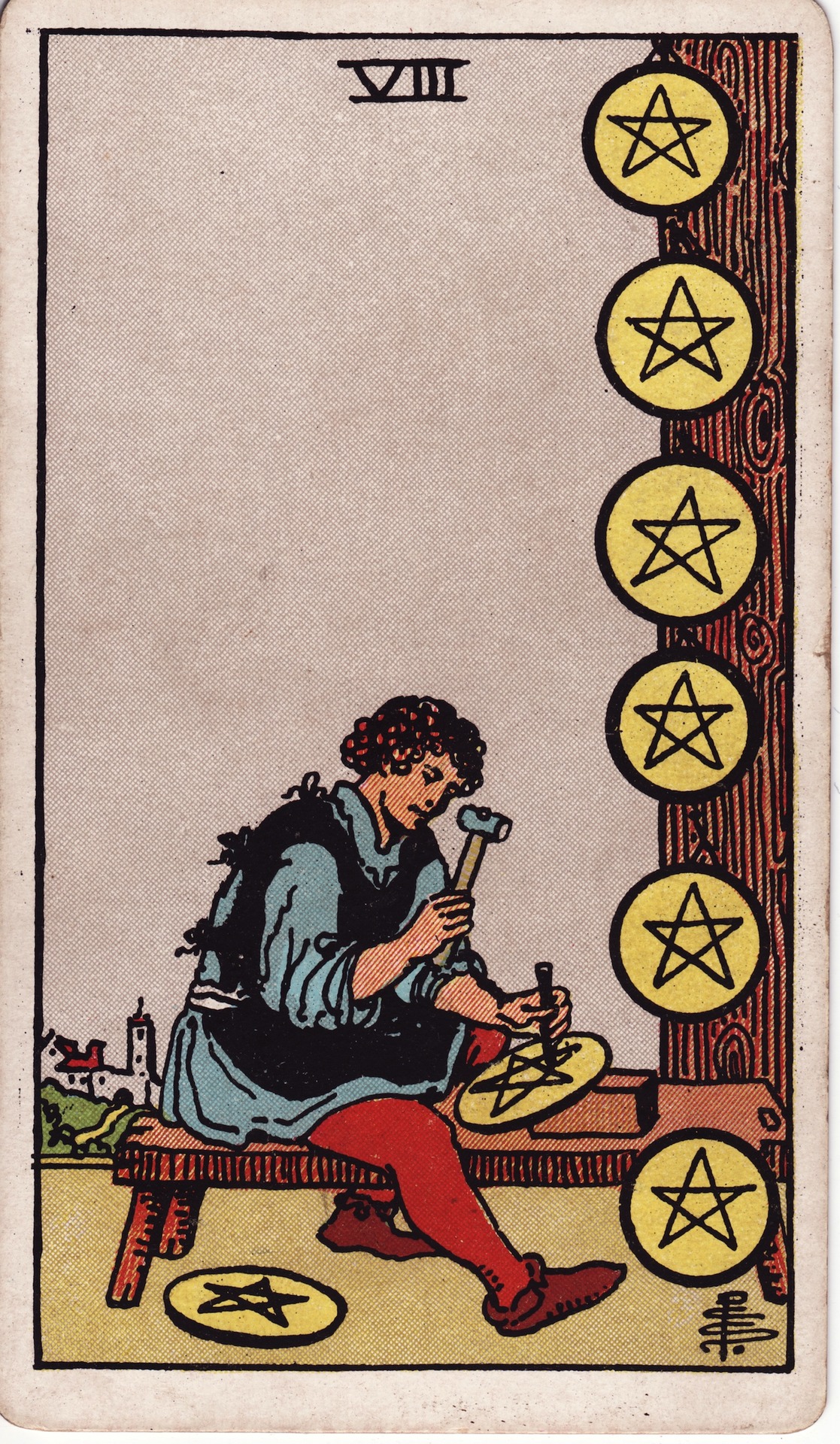
AKA Lord of Prudence
Transform the world!
Thou inner sense of sight,
Transform my soul!
— Arthur Waite, Collected Poems
The planetary aspect here is a very practical one which tends to cause concern with small details. Like the rest of the eights, any gain which may appear is limited, and "Prudence" is no great virtue.
Work, whether physical, artistic, or spiritual (the Sufi Idries Shah speaks of 'work' as the most basic of Sufi doctrines) , cannot succeed if the person thinks only of the end result.
When reversed the card suggests primarily impatience and the situations resulting from it: frustration, unfulfilled ambition, envy or jealousy. These things may result from the attitude of looking only to success, and not to the work that brings it. They may also arise from unsatisfying work, that is, a job or career which calls for no skill, no personal involvement, no pride.
While the Three of Pentacles is about proportionately more recognition than effort, the Eight of Pentacles is about proportionately more effort than recognition. Note how many pentacles the apprentice has crafted in this card and hung up for display, and yet no one is around to admire the work.
The Eight of Pentacles reflects creative satisfaction. Pride in work permeates the card as the craftsman hangs examples of his handiwork, the pentacles, in a line up the right side of the card as if they were a ladder on which he could ascend to new heights. It is the card of throwing out distractions, battening down the hatches, and getting serious about work. It is hitting the books or the canvas and using whatever tools, real or metaphorical, you use for your job, career, or hobby.
Freemason symbolism permeates this card, as it did in the Three of Pentacles. The Masonic apron (protection), bench (elevated space), and tool (agent of change) are drawn. The addition of Masonic symbolism brings a deeper metaphysical realm to the card. It asks the observer, how are you the architect of your life? What have you built with your talents, thoughts, and actions? The Masonic element speaks to the nature of internship and apprenticeship. Who is your mentor or do you mentor others? Is there an underlying system to the way in which you live your life?
The esoteric title is the “Lord of Prudence.” Prudence is one of the four cardinal virtues recognized in classical antiquity, along with Temperance, Justice, and Fortitude (Strength). Prudence is the only cardinal virtue not to appear in the major arcana. To possess prudence means having a practical and discreet nature. The ability to employ the discipline of reason is exemplified by this card. The astrological traits of Virgo include an analytic mind, hard work, and a practical nature.
Waite tells us the artist’s work “is displayed in the form of trophies.” This informs the reader the work is exemplary and award winning. Pamela’s design is inspired by the Tarocchi of Mantegna (E series). Her card closely resembles the card of Artixan, or artisan, who is found two cards after the Beggar card that inspired the design for the Seven of Pentacles. The Mantegna card shows an artist hard at work who is shadowed by his younger apprentice.
[1] Graham, Sasha. Llewellyn's Complete Book of the Rider-Waite-Smith Tarot: A Journey Through the History, Meaning, and Use of the World's Most Famous Deck.
[2] Wang, Robert. The Qabalistic Tarot: A Textbook of Mystical Philosophy
[3] Wen, Benebell. Holistic Tarot: An Integrative Approach to Using Tarot for Personal Growth.
[4] Pollack, Rachel. Seventy-Eight Degrees of Wisdom: A Book of Tarot.